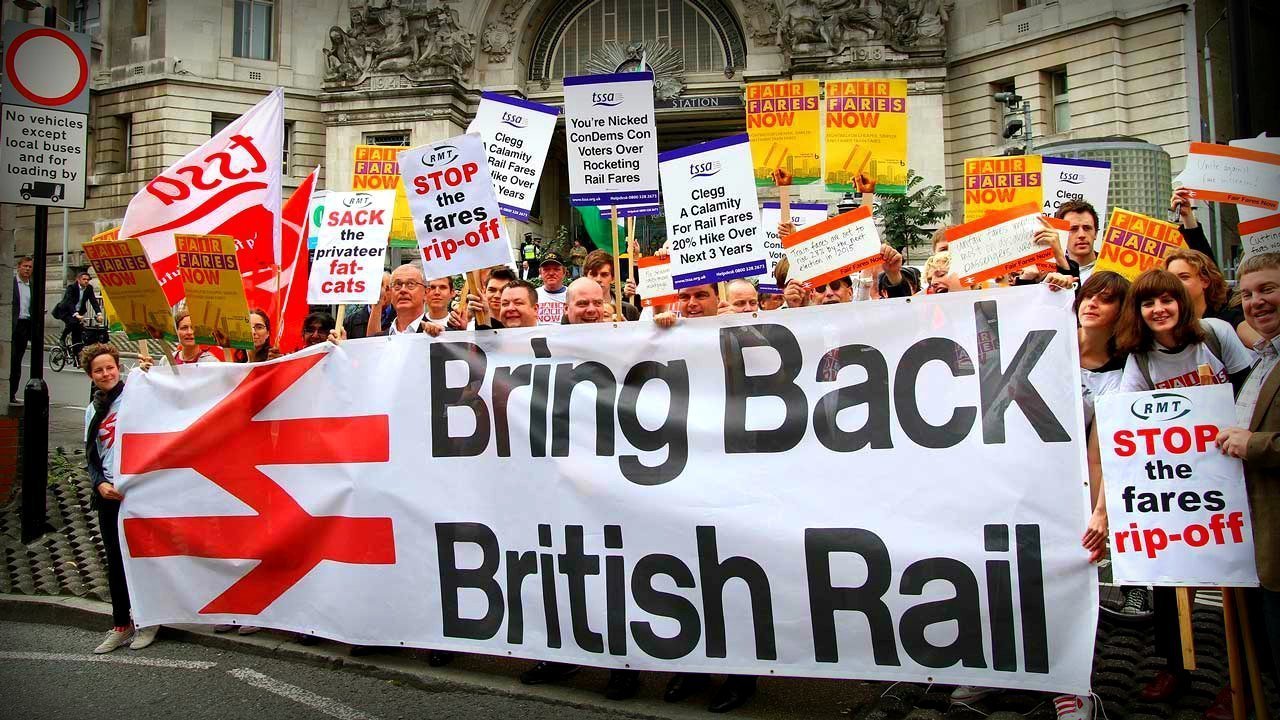The beginning of 2018 saw another eye-watering rise in rail prices. Private rail firms have run the network into the ground, with the public shouldering the costs. As Rob Sewell explains, the railways need to be nationalised immediately without compensation.
The highwaymen of long ago are alive and kicking. They are not the individual rogues of the past but capitalist corporations. These privateers have been holding up the rail-traveling public for years. This January is no different. The privatised rail robbers do not carry pistols these days; they have something far more powerful: their monopoly ownership over rail transport.
This month sees the biggest annual fare rise for five years. Protests organised by the RMT rail union and attended by some Labour politicians took place at dozens of stations in England on the first day of passengers having to pay average fare increases of 3.4%, with season tickets increasing by 3.6%.“It’s not a public transport service if most people can’t afford it,” said Lynn Macdonald, a PA travelling home to Bristol. “It’s become way too expensive.”
Of course, the transport minister Grayling was far away in Qatar sowing up business deals. He had the cheek to blame the fare hikes on greedy union members.
Handouts for big business
At the same times as hitting passengers with huge fare rises, these privatised rail companies are receiving taxpayer handouts. They say it is for modernisation. But figures from the rail regulator showed that most of Britain’s trains are now older than ever since privatisation, with 42-year-old trains still operating on some parts of the network.
Over the festive season, large sections of the rail network were shut (as they now often are at weekends and bank holidays) under the excuse of essential upgrade work. In reality this is to save costs on repairs and maintenance, which would otherwise have to be done at night, and to avoid running trains on the less-profitable non-working days. Passengers are left with the infamous rail replacement bus service (usually old double-deckers) and the prospect of a much longer journey time.
According to TUC research, rail fares in the UK are much more expensive than in Europe where the rail services are publicly owned. While the cheapest single ticket to London will cost a British passenger 50p per mile, German passengers are paying just 19p a mile for an equivalent type of journey. British passengers traveling from Chelmsford to London are paying out 13% of their income on travel; a French worker travelling from Étampes to Paris will see only 2% of their income spent on travel.
Andy McDonald, the shadow transport secretary, who joined protesters at King’s Cross station in London said:
“I think people have got to the end of their tether and quite understandably so… This franchise system has completely and utterly failed. We have a fractured, expensive and complex system – it duplicates costs and there are dividends going out to subsidise railways on the continent. This is an absolute racket.”
Just how much of a racket can be seen by looking at the government deal made last November that will see Stagecoach and Virgin being relieved of the East Coast franchise in 2020, three years earlier than scheduled, because the companies are currently clocking up heavy losses on the line. Instead of bringing the network back into public ownership, Grayling intends to introduce a loosely defined “public-private” partnership from 2020 onwards. In commonly understood language, that’s a bailout. The companies pocket the profits and the taxpayer pockets the losses.
This bailout means that every other loss-making franchise will expect the same handout, costing us billions. These companies have made assurances but they are not worth the paper they are written on. Despite all the claims, the rise in rail usage is not because of privatisation but despite it.
Nationalise the railways!
No wonder a big majority of the public, including even Tory voters, now favour bringing the railways back into public ownership.
Labour must not wait until all the franchises are up for renewal before the railways are brought back into public hands. They should all be nationalised during the first days of a Labour government. The rail workers know how to run the service; the privateers just know how to fleece us.
Rather than paying out massive compensation, these companies should not receive a single penny more. They have robbed us for quite long enough, grabbing from taxpayers and passengers alike and giving nothing in return. These modern day highwaymen should be sent packing.






